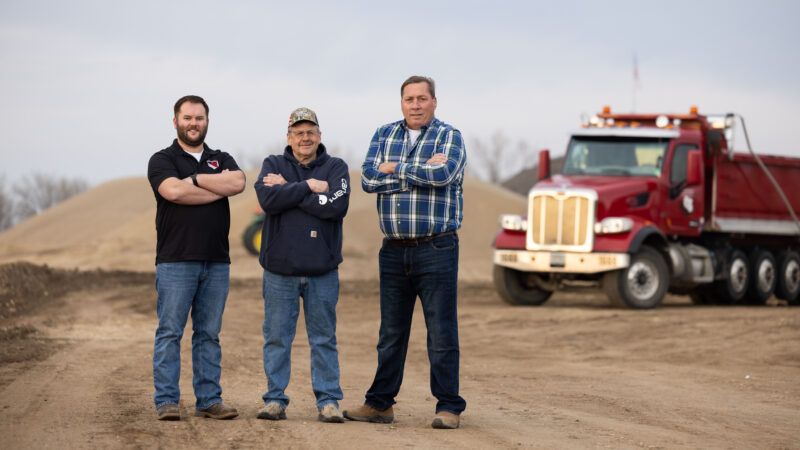What Happens When a County Employee Acts Like a Police Officer?
A highway engineer got qualified immunity for detaining drivers—despite not being a cop.

It's likely that a large chunk of the people reading this have had the unenviable experience of being pulled over by a police officer for a traffic infraction. You know what you're supposed to do. But what are you supposed to do when a government employee who is not a police officer pulls you over, detains you for hours, and tries to perform a traffic stop, despite having no authority to do so?
According to the U.S. Court of Appeals for the 8th Circuit, you are, in some circumstances, supposed to accept this—as if working as, say, a highway engineer confers the monopoly on power held by the state. If government has one thing, it is the audacity.
This is not a hypothetical for Jonathan Large, one such engineer working for Mahnomen County, Minnesota. In 2017, he took umbrage with CSI, a road repair company, in a petty dispute that quickly escalated into much more.
The nitty-gritty details go something like this: The state of Minnesota hired CSI to execute some highway repairs, which required them to travel on specific roads to complete the assignment. Large, as the overseer of those haul roads, tried to stop the company from using them; the state ultimately gave CSI access to some, but not all, routes. As the project progressed, CSI requested access to another road, which they would travel on after emptying their load, thus mollifying any concerns about weight limits.
Large was not mollified. About an hour before CSI would be on that road, he let them know that he had (arbitrarily) lowered the weight limit, so as to disqualify their travel. Upon seeing two CSI trucks saunter toward him, Large used his vehicle to block their path; one driver testified he witnessed government officials changing the weight signs in front of them. Large then said they would need to wait for police to come and ticket them before he proceeded to call the sheriff's office, the White Earth Tribal Police Department, and state troopers, all to address a truck he alleged was overweight as other seemingly overweight trucks continued down the road unbothered.
"Large arbitrarily lowered the limit from 5 tons per axle to 5 tons total, which would make it illegal for even many pickups or vans to use those roads. Large did this to target my company's trucks—which were running empty on these roads—for his petty powerplay," said Allan Minnerath, CSI's president, in a statement. "He let other heavier trucks pass while he only stopped CSI trucks and detained the drivers. If it is a free country, that means we should be able to drive on roads just like everybody else, and any government official who abuses their power like this needs to be held to account."
So CSI sued. For usurping this extrajudicial authority, the federal courts awarded Large qualified immunity, which sometimes protects local and state actors from facing civil suits for violating the Constitution.
But the reasoning behind that decision—that CSI is not legally permitted to ask a jury to consider their case—may sound like parody to a layman. The doctrine of qualified immunity protects government employees when the alleged violation is not "clearly established" in a prior court precedent, meaning CSI had to find a previous ruling with nearly identical facts. The result: "Under the unique circumstances of this case, we cannot say that it was clearly established that Large…could not call law enforcement to investigate compliance with the new, reduced weight restrictions," wrote Circuit Judge Bobby Shepherd. You'd be forgiven for already assuming such a similar case did not exist, but this is the standard demanded by the often-unforgiving protections afforded to the state.
CSI is now asking the U.S. Supreme Court to hear the case and to make it crystal clear that government officials are not protected for misconduct when assuming duties and powers that aren't in their purview. "If there is one thing that proponents and opponents of qualified immunity agreed on, it is this," said Anya Bidwell, who is representing CSI with the Institute for Justice, in a statement. "Government officials can only claim qualified immunity if they were doing their jobs; officials can't receive qualified immunity when their actions far exceed any reasonable interpretation of their authority….The courts must make it clear that Large should—and in fact must—leave the job of law enforcement to those entrusted with law enforcement."
Importantly, the majority argued that Large hadn't actually detained anyone, because he didn't exercise brute force. But this fails to reckon with the fact that Large instituted a roadblock hamstringing CSI's vehicles and ordered them to remain in place for police, allegedly for about 3.5 hours.
It was a point not lost on Circuit Judge L. Steven Grasz, who dissented. "There's a new sheriff in town," he wrote. "The holding implicitly cloaks such officials [like Large] with near-absolute immunity for their actions since there are no existing cases circumscribing or defining the scope of this newly discovered, unwritten law enforcement authority."
Over the past few years, some Republican politicians have made defending qualified immunity a core prong of their campaigns. Ensuring government unaccountability is, by partisan definition, a strange hill for conservatives to die on. To that point, Grasz, the dissenting judge, was appointed by President Donald Trump—a reminder of the difference between pure politicking and policy.
